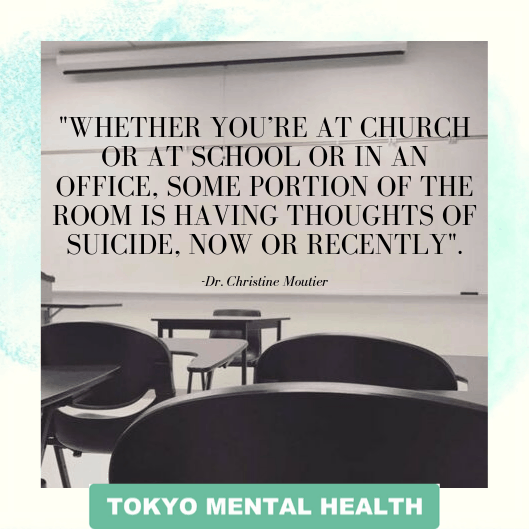- 2019/10/02
- Self Help & Tips
[:en]

Angelica Gomez
In 2017 suicide rates in Japan were at about 21,000 deaths per year. Wataru Nishida, a psychologist at Tokyo’s Temple University claims that “Japan has no history of Christianity, so here suicide is not a sin. In fact, some look at it as a way of taking responsibility”. In 2014 on average 70 Japanese people committed suicide daily. Suicide is a topic that a lot of people still don’t know enough about. It is often assumed that the only people who commit suicide are those that are always depressed; and that is not always the case.
In general, depression acts as a lens that causes most thoughts to be negative, the view of self to be negative, and the view of the world to be negative. As these thoughts continue to exist over time, they grow into feelings of hopelessness and helplessness. This accumulation generally happens over weeks and months until severe depression takes root. Once there, it is very easy for these negative, helpless, hopeless thoughts to turn into idealizing suicide. Since this tends to happen over time, it may be hard to notice your friend or loved one slipping into depression. They may be the smiling person at the party still but underneath that could be a very different reality. What can we do? Knowing the signs of depression and being able to spot signs of suicidal idea can help you be a support for someone who is going through this. Below are some common behaviors to look out for in someone that you suspect might be depressed or planning to take their own life.
– Withdrawal from family members and friends
– Changes in behavior/presence of new behaviors such as:
– Someone that is normally very talkative starts to keep to themselves and stay quiet
more often
– Someone that is usually very shy and quiet starts to be very social and
outgoing
– Searching online for methods on how to commit suicide
– Increased use of alcohol and/or drugs
– Giving away items that are important to them
– Suddenly calling loved ones to say goodbye
– Losing interest in their jobs/ relationships
– Sleeping excessively or not enough
– They voice out that they feel helpless and feel like a burden to others
Who is at risk?
– Anyone that has already had a previous suicide attempt
– Anyone that has a family history of suicide
– Anyone that misuses alcohol and/or drugs
– Anyone that has suffered a recent loss
– Anyone who has been exposed to abuse
– Anyone who served in the military
– The elderly, because the rates increase with age
– Someone who has a mental illness such as:
– Depression, Anxiety Disorders, and Bipolar Disorder
What can you do to help?
The most important thing that you can do to help someone that is feeling suicidal is use the method of ‘reassurance’. Reassure them that they are not alone. The best way to do this is to simply listen to what they have to say without judgement and offer to sit in silence if they cannot find the words. Often times, someone that is feeling suicidal won’t come up to you on their own to voice out their feelings. It is okay to ask someone how they are doing emotionally and if you think they may be suicidal ask. Research shows that intorducing the topic of suicide and asking the person if they are experiencing thoughts of suicide does not increase the risk of someone attempting suicide. In fact, it actually decreases the likelihood of a suicidal person trying to complete the act. After reassuring them that you are there for them, there are some other steps that you can take:
– Ask them if they have had/ are having, any suicidal thoughts directly.
– Make sure that they are not alone: if they voice out that they are feeling suicidal commit to connecting with them on a regular basis and find ways to help them see they are supported.
– Help them find help. It is hard to seek out help if you’re feeling hopeless and defeated. As a loved one, you can take some time to find an organization, seek medical help or refer them to someone else that has worked with suicide before and knows how to handle this situation.
– Communication is key, check up on them even after they seem to be doing better. They might do well for a bit but bounce back into the suicidal thoughts faster than you would think.
Death by suicide occurs everyday. You can’t see the emotional baggage and pain that someone is carrying with them daily. Understanding that it can happen to anyone, and that the simple act of being there to listen to someone can actually save their life, is important.
Sources:
“About Suicide.” AFSP, 7 Sept. 2017, afsp.org/about-suicide/
Kindelan, Katie. “National Suicide Prevention Week: What You Can Do to Prevent Suicide.” ABC News, ABC News Network, 10 Sept. 2018, https://abcnews.go.com/GMA/national-suicide-prevention-week-%20prevent%20-suicide/story?id=57649079
“Suicides among Japanese Young People Hit 30-Year High.” BBC News, BBC, 5 Nov. 2018, www.bbc.com/news/world-asia-46096626
[:]